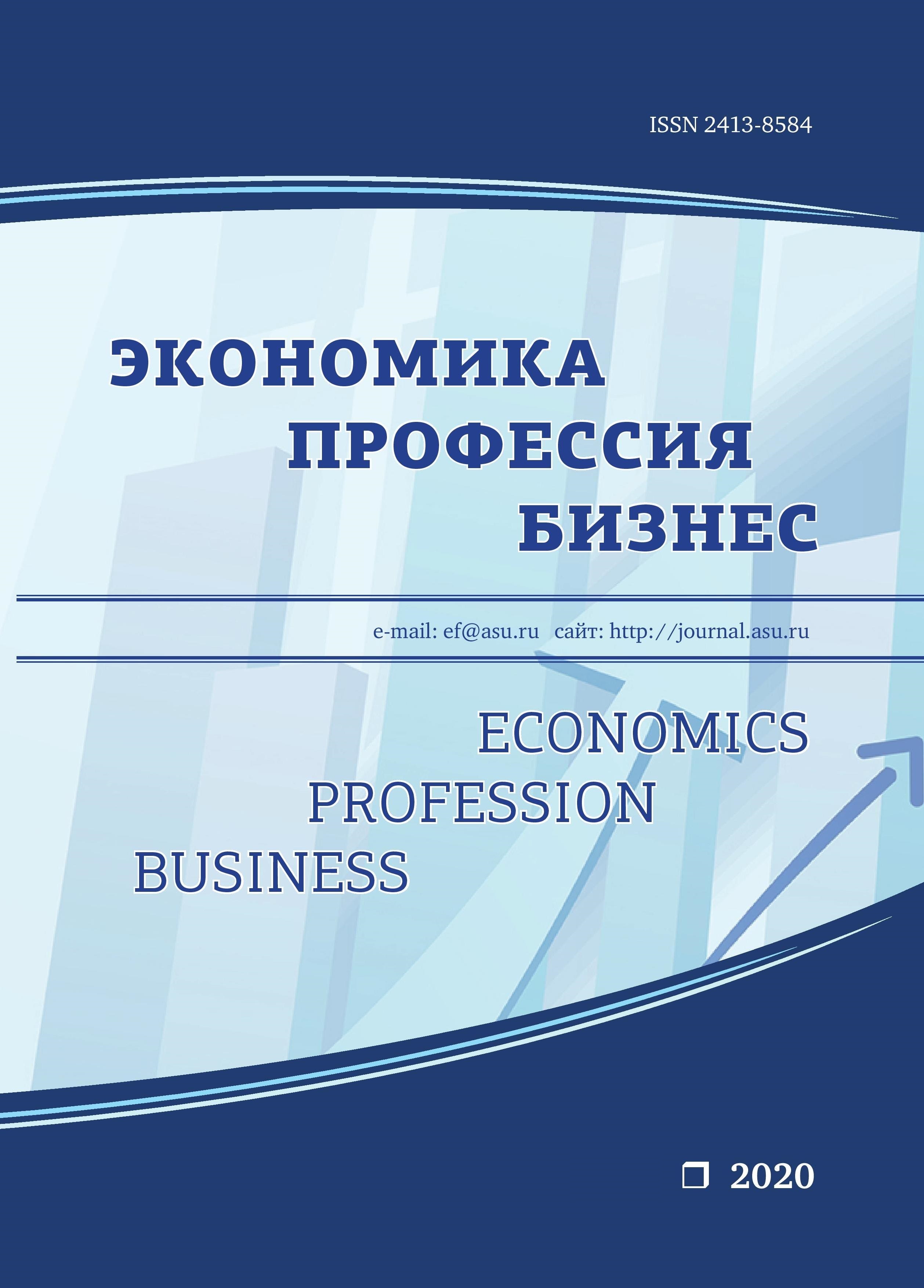DEVELOPMENT OF ADDIMAL PROFESSIONAL EDUCATION ACCORDANCE WITH MODERN LABOR MARKET REQUIREMENTS
УДК 331.5
Abstract
The presented article considers topical issues of functioning and development of the system of additional vocational education, as an element of continuing vocational education, in ensuring breakthrough socio-economic development of the country in modern conditions. As part of the analysis of statistical data, priority areas of development of the DPO system were considered and the main possible consumers of this service sector, as well as the age distribution of potential consumers, were investigated. The information base of the study is the statistical data of Rosstat and the information provided by the Internet sources on the functioning of the system of additional vocational education. Within the framework of the study, the main problems and key contradictions that inhibit the development of the DPO system in the conditions of constant modernization of the education system and significant changes in the demands of the labor market for a competitive labor force were analyzed and highlighted. The results obtained in the study can be used in the development of strategic and policy documents, as well as the formation of measures for the development of the education sector, in particular the system of additional vocational education.
Downloads
Metrics
References
Коршунов И. А., Гапонова О. С. Непрерывное образование взрослых в контексте экономического развития и качества государственного управления // Вопросы образования. 2017. № 4. С. 36-59.
Потанин Б. С. Оценка влияния высшего образования на заработную плату работника // Проблемы прогнозирования. 2019. №3. С.118-126.
Россошанская Е. А. Качество трудового потенциала за пределами крупных городов // Экономические и социальные перемены: факты, тенденции, прогноз. 2018. Т. 11, № 1. С. 164-179. DOI: 10.15838/ esc.2018.1.55.11.
Попова Л. А., Зорина Е. Н. Проблемы реализации активного долголетия в трудовой сфере (на примере Республики Коми) // Экономические и социальные перемены: факты, тенденции, прогноз. 2020. Т. 13, № 2. С. 143-156. DOI: 10.15838/esc.2020.2.68.9.
Лебедева Н. В. Обучение взрослых на курсах переподготовки: принципы и условия // Научный диалог. 2013. № 4 (16). С. 12-17.
Снопко Н. М. История развития концепции «Непрерывного образования» // Научные исследования в образовании. 2008. № 6. URL: https://cyberleninka.ru/article/n/istoriya-razvitiya-kontseptsii-nepreryvnogo-obrazovaniya (дата обращения: 18.08.2020).
Анисимов Е. В. Формирование и развитие профессиональной квалификации персонала: автореф. дисс. ... канд. пед. наук. М., 2004. 24 с.
Алтыпова Т. В. Системное управление качеством образовательного процесса в колледже // Среднее профессиональное образование. 2005. № 6. С. 35-39.
Вершловский С. Г. Взрослый как субъект образования // Педагогика. 2003. № 8. С. 3-8.
Болотов В. А. Становление общероссийской системы оценки качества образования // Вестник образования. 2007. № 14. С. 47-53.
Полушкина Е. А. Дополнительное образование: риски и вызовы URL: https://www.ranepa.ru/images/News/2019-06/11-06-2019-polushkina.pdf (дата обращения: 20.08.2020).
Марон А. Е. Практическая андрогогика. Книга 5. Открытое образование взрослых: монография. СПб., 2012. 400 с.
REFERENCES
Korshunov I. A., Gaponova O. S. Continuous education of adults in the context of economic development and quality of public administration // Education Issues 2017, № 4. Рp. 36-59.
Potanin B. S. Assessment of the impact of higher education on employee wages // Problems of forecasting. 2019. №3.Pp. 118-126.
Rossoshanskaya E. A. The quality of labor potential outside of large cities // Economic and social changes: facts, trends, forecast. 2018. Vol. 11. № 1. Pp. 164-179. DOI: 10.15838/esc.2018.1.55.11.
Popova L. A., Zorina E. N. Problems of realizing active longevity in the labor sphere (by the example of the Komi Republic) // Economic and social changes: facts, trends, forecast. 2020. Vol. 13. № 2. Pp. 143-156. DOI: 10.15838/esc.2020.2.68.9.
Lebedeva N. V. Teaching adults at retraining courses: principles and conditions // Scientific dialogue. 2013. № 4 (16). Pp. 12-17.
Snopko N. M. History of the development of the concept of “Continuous education” // Scientific research in education. 2008. № 6. URL: https://cyberleninka.ru/article/n/istoriya-razvitiya-kontseptsii-nepreryvnogo-obrazovaniya (date of access: 18.08.2020).
Anisimov E. V. Formation and development of professional qualifications of personnel: Author’s abstract. diss. . cand. ped. sciences. M., 2004. 24 p.
Altypova T. V. Systemic quality management of the educational process in college // Secondary vocational education. 2005. №. 6. Pp. 35-39.
Vershlovsky S. G. An adult as a subject of education // Pedagogy. 2003. № 8. Pp. 3-8.
Bolotov V. A. Formation of the all-Russian system for assessing the quality of education // Education Bulletin. 2007. № 14. Pp. 47-53.
Polushkina E. A. Additional education: risks and challenges URL: https://www.ranepa.ru/images/News/2019-06/11-06-2019-polushkina.pdf (date of access: 20.08.2020).
Maron A. E. Practical androgogy. Book 5. Open adult education: monograph. SPb., 2012. 400 p.
Economics Profession Business is a golden publisher, as we allow self-archiving, but most importantly we are fully transparent about your rights.
Authors may present and discuss their findings ahead of publication: at biological or scientific conferences, on preprint servers, in public databases, and in blogs, wikis, tweets, and other informal communication channels.
Economics Profession Business (EPB) allows authors to deposit manuscripts (currently under review or those for intended submission to EPB) in non-commercial, pre-print servers such as ArXiv.
Authors who publish with this journal agree to the following terms:
- Authors retain copyright and grant the journal right of first publication with the work simultaneously licensed under a Creative Commons Attribution License that allows others to share the work with an acknowledgement of the work's authorship and initial publication in this journal.
- Authors are able to enter into separate, additional contractual arrangements for the non-exclusive distribution of the journal's published version of the work (e.g., post it to an institutional repository or publish it in a book), with an acknowledgement of its initial publication in this journal.
- Authors are permitted and encouraged to post their work online (e.g., in institutional repositories or on their website) prior to and during the submission process, as it can lead to productive exchanges, as well as earlier and greater citation of published work (See The Effect of Open Access).









